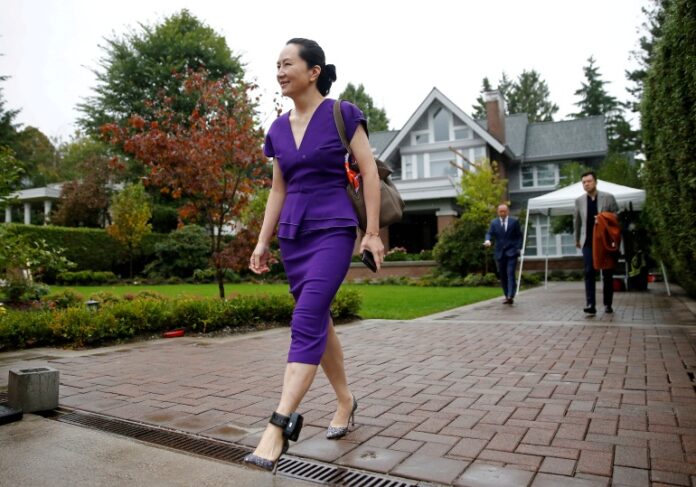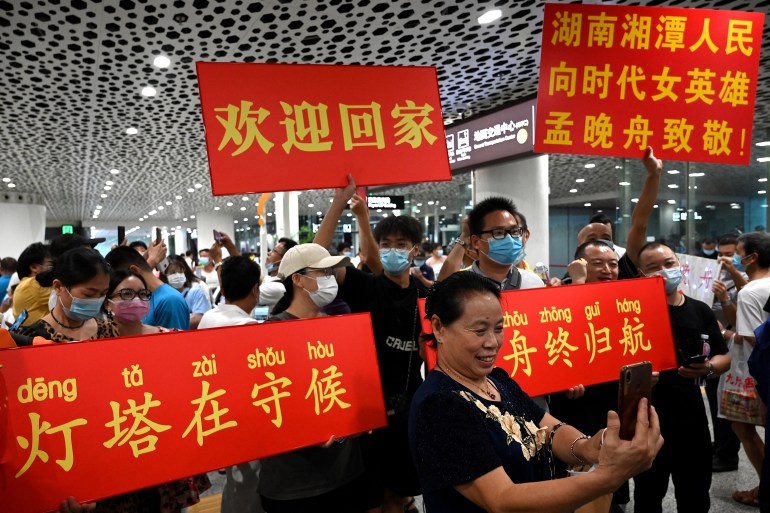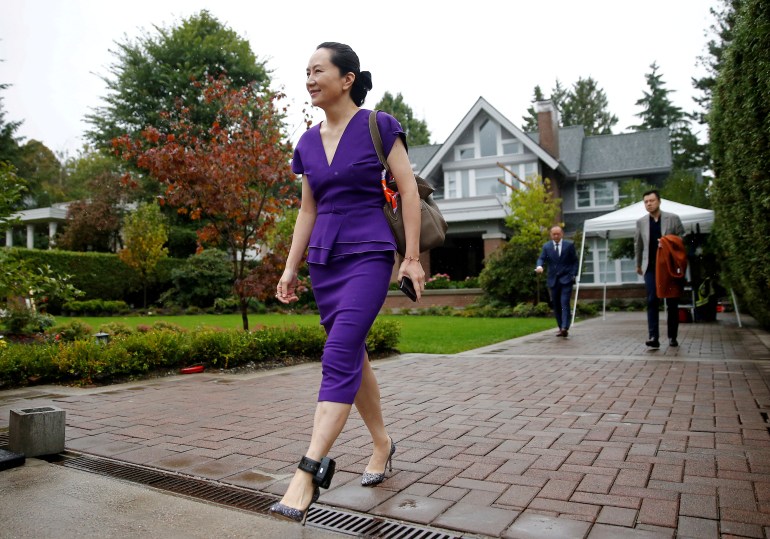
An executive of Chinese global communications giant Huawei Technologies has returned from Canada following a legal settlement that also saw the release of two Canadians held by China.
Meng Wanzhou, Huawei’s chief financial officer and the daughter of the company’s founder, arrived Saturday evening aboard a chartered jet provided by flag carrier Air China in the southern technology hub of Shenzhen, where Huawei is based.
Her return, met with a flag-waving group of airline employees, was carried live on state TV, underscoring the degree to which Beijing has linked her case with Chinese nationalism and its rise as a global economic and political power.
Wearing a red dress matching the colour of China’s flag, Meng thanked the ruling Communist Party and its leader Xi Jinping for supporting her through more than 1,000 days in house arrest in Vancouver, where she owns two multimillion-dollar mansions.
“I have finally returned to the warm embrace of the motherland,” Meng said. “As an ordinary Chinese citizen going through this difficult time, I always felt the warmth and concern of the party, the nation and the people.”
- UK PM Johnson raises taxes to tackle health and social care crisis
- World reacts as Taliban announces new Afghan government
Meng, 49, was arrested at Vancouver International Airport in December 2018 on a United States warrant, and was indicted on bank and wire fraud charges for allegedly misleading HSBC in 2013 about the telecommunications equipment giant’s business dealings in Iran.

Her arrest sparked a diplomatic storm and drew Canada into the fray when China arrested two Canadians – Michael Spavor, a businessman and Michael Kovrig, a former diplomat shortly after Meng was taken into custody.
Beijing has denied publicly that the arrests are linked.
Ment spent three years of house arrest in Canada fighting extradition to the United States for allegedly violating US sanctions.
Officials said Meng reached an agreement with US prosecutors to end the bank fraud case against her. As part of the deal, known as a deferred prosecution agreement, she accepted responsibility for misrepresenting the company’s business dealings in Iran.
The move allows her to leave Canada, relieving a point of tension between China and the US.
On the same day, Kovrig and Spavor were also released and flown back to Canada. They were detained shortly after Canada arrested Meng. Many countries labelled China’s action “hostage politics,” while China accused Ottawa of arbitrary detention.
Canadian broadcast footage showed Meng boarding a flight on Friday to the city of Shenzhen shortly after she was granted release in a Vancouver court hearing, according to AFP news agency.
The South China Morning Post also confirmed the news report saying that about two hours after the court’s decision, Meng boarded an unscheduled Air China 777 flight that departed Vancouver International Airport at 4:29pm local time.
China has yet to issue an official statement on Meng’s release. But Lijian Zhao, a senior foreign ministry spokesman, wrote in one of his social media accounts saying, “Welcome home.”
Shortly before Meng’s return to China, the Communist Party’s flagship People’s Daily newspaper declared the resolution of the case as a “glorious victory for the Chinese people” achieved through the “unremitting efforts of the Chinese government”.
The state-backed Global Times also welcomed Meng’s release, while remaining critical of Canada with one analyst accusing it of being a “willing accomplice” of the United States.
The years-long extradition drama has been a central source of discord in increasingly rocky ties between Beijing and Washington, with Chinese officials signalling that the case needed to be dropped to help end a diplomatic stalemate between the world’s top two powers.
The deal also opens US President Joe Biden up to criticism from China hawks in Washington who argue his administration is capitulating to China and one of its top companies at the centre of a global technology rivalry between the two countries.
In an exclusive on Friday, Reuters news agency reported that the US reached a deferred prosecution agreement with Meng.
Nicole Boeckmann, the acting US attorney in Brooklyn, said that in entering into the agreement, “Meng has taken responsibility for her principal role in perpetrating a scheme to defraud a global financial institution.”
The agreement pertains only to Meng, and the US Justice Department said it is preparing for trial against Huawei and looks forward to proving its case in court.
A spokeswoman for Huawei declined to comment.

Sigh of relief
At a hearing in Brooklyn federal court on Friday, that Meng attended virtually from Canada, Assistant US Attorney David Kessler said the government would move to dismiss the charges against her, if she complies with all of her obligations under the agreement, which ends in December 2022.
He added that Meng will be released on a personal recognisance bond, and that the US plans to withdraw its request to Canada for her extradition.
Meng pleaded not guilty to the charges in the hearing.
When US District Court Judge Ann Donnelly later accepted the deferred prosecution agreement, Meng sighed audibly.
A Canadian judge later signed Meng’s order of discharge, ending her bail conditions and allowing her to go free after nearly three years of house arrest.
She was emotional after the judge’s order, hugging and thanking her lawyers.
Speaking to supporters and reporters on the steps of the court afterwards, Meng thanked the judge for her “fairness” and talked of how the case had turned her life “upside-down”.




